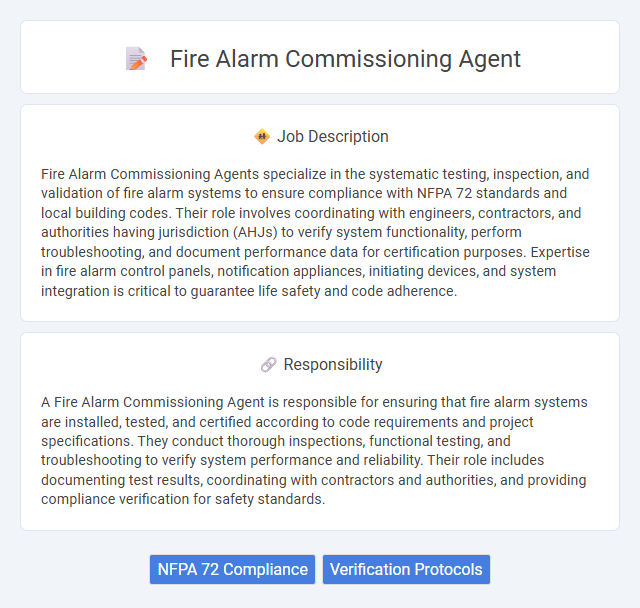
Fire Alarm Commissioning Agents specialize in the systematic testing, inspection, and validation of fire alarm systems to ensure compliance with NFPA 72 standards and local building codes. Their role involves coordinating with engineers, contractors, and authorities having jurisdiction (AHJs) to verify system functionality, perform troubleshooting, and document performance data for certification purposes. Expertise in fire alarm control panels, notification appliances, initiating devices, and system integration is critical to guarantee life safety and code adherence.
Individuals with strong attention to detail and a solid understanding of fire safety systems are likely suitable for a Fire Alarm Commissioning Agent role. Those who can work well under pressure and have good problem-solving skills may find this job fitting. Physical fitness might also be necessary due to on-site inspections and equipment handling.
Qualification
A Fire Alarm Commissioning Agent must have a thorough understanding of NFPA 72 standards and fire alarm system design principles. Certifications such as NICET Level II or higher in Fire Alarm Systems and experience with system programming, testing, and troubleshooting are essential. Strong knowledge of electrical codes and hands-on experience with fire alarm equipment ensure compliance and effective system performance verification.
Responsibility
A Fire Alarm Commissioning Agent is responsible for ensuring that fire alarm systems are installed, tested, and certified according to code requirements and project specifications. They conduct thorough inspections, functional testing, and troubleshooting to verify system performance and reliability. Their role includes documenting test results, coordinating with contractors and authorities, and providing compliance verification for safety standards.
Benefit
Hiring a Fire Alarm Commissioning Agent may significantly enhance the accuracy and reliability of fire alarm systems, reducing the likelihood of system malfunctions and false alarms. This role likely improves compliance with safety regulations, potentially minimizing legal risks and costly fines for organizations. Investing in a certified agent could result in long-term savings through optimized system performance and decreased maintenance needs.
Challenge
Fire Alarm Commissioning Agents likely face challenges ensuring system compliance with evolving safety codes and standards, which requires continuous learning and adaptation. They probably encounter complex troubleshooting scenarios that demand precise technical knowledge and keen attention to detail. Coordinating with multiple stakeholders to align on safety requirements might also pose significant logistical and communication difficulties.
Career Advancement
A Fire Alarm Commissioning Agent ensures fire alarm systems meet regulatory standards through rigorous testing and documentation. Career advancement opportunities include roles such as Senior Commissioning Agent, Project Manager, or Fire Protection Consultant, leveraging expertise in system design and compliance. Developing skills in automation technology and gaining certifications like NICET or NFPA enhance prospects for higher-level technical and supervisory positions.
Key Terms
NFPA 72 Compliance
A Fire Alarm Commissioning Agent ensures that fire alarm systems meet NFPA 72 standards by conducting comprehensive inspections, performance testing, and system verifications. Their role involves validating system components such as smoke detectors, control panels, and notification appliances to guarantee proper functionality and compliance with fire safety codes. Accurate documentation and collaboration with stakeholders help maintain adherence to the National Fire Alarm and Signaling Code, minimizing risks during emergencies.
Verification Protocols
Fire Alarm Commissioning Agents ensure compliance with industry standards by rigorously implementing verification protocols, including functional testing and system performance evaluations. They document all test results to verify that fire alarm components operate according to NFPA 72 guidelines and local fire codes. Accurate verification ensures system reliability, safety, and readiness in detecting and alerting fire emergencies.
 kuljobs.com
kuljobs.com